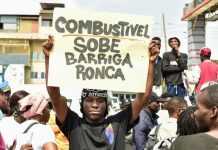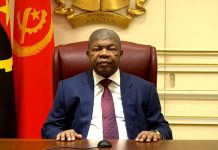By Evaristo Mulaza
Africa-Press – Angola. With his usual monotonous appearance, but with his face still marked by the serenity of someone who enjoyed the benefit of the doubt from the majority of Angolans, João Lourenço told the Portuguese broadcaster RTP in March 2019 that there was no hunger in Angola. “In terms of hunger, for example, you can’t say that there is hunger in Angola,” the President stated with disturbing coldness.
Sufficiently uninformed about the reality he was questioning, the Portuguese journalist almost rushed to agree with the President. “There may be malnutrition…”, the interviewer hurriedly replied. “There may be some malnutrition, there always is some. But, even so, compared to the years of conflict, there has been quite a significant evolution”, the President replied, in the middle of Cidade Alta. The Palace is just a few kilometres away from countless shanty towns, where hunger, like an unassailable virus, has always resided in the homes of thousands of families.
The first public declaration of the absence of hunger in Angola would be one of the first shivers that the President of the Republic would have caused to any sensible person. It so happened that a significant majority of Angolans were still intoxicated by the project to dismantle the legacy of José Eduardo dos Santos.
Until further evidence to the contrary is provided, João Lourenço’s words should be seen as well-intentioned and perhaps even honest. Or, if anything, as a mere slip of the tongue from a self-proclaimed reformer who, in the following moments of the interview, promised to leave citizens’ rights and freedoms “at the highest possible level”.
For those who believed in the latter hypothesis, it was short-lived. A little over a year and a half later, João Lourenço delved into the memories of the interview with the Portuguese channel to reaffirm himself as a man of unshakable, albeit disoriented, convictions. “Hunger is always relative”, he determined, in December 2021, at a rally before members of his party.
However, times were different. The period of grace that the Angolans had kindly granted him was over. With the exception of the MPLA militants and their underhanded activists, who went out of their way to defend the indefensible, everyone fell upon him.
The widespread images of families who jostled daily in the bins looking for rubbish to fill their stomachs were already shocking enough. Hearing from the President himself that hunger was relative made it all the more serious and surreal. Because it wasn’t just about insensitivity being taken to an unparalleled level.
What many people understood, in definitive terms, was that João Lourenço had no idea of the country he was dealing with. Which meant, among all the serious things, that the Angolans who were starving were literally left to their own devices. They could not count on the Government, because the Government is a person who never knew that there had always been hunger in Angola.
However, this is not where the story ends. More than two years after the last thesis that theorized the relativization of hunger in his own country, João Lourenço goes to New York to defend the eradication of extreme poverty in the world. For those who thought he was inconsistent, he was completely wrong.
The Angolan President remained true to his word. For him, the distinction between one thing and the other is not only possible, it is absolutely clear. Where there is extreme poverty there is not necessarily hunger.
Hunger will continue to be relative, at least in Angola. It was for this reason that, in the speech in which he defended the eradication of all forms of poverty, he did not make a single reference to hunger. Much less to hunger in Angola.
No one can accuse him of breaking his word in this regard. He is the aspiring new philosopher, (un)conformable with his successive failures on the chessboard.
ANGOLA24
For More News And Analysis About Angola Follow Africa-Press






